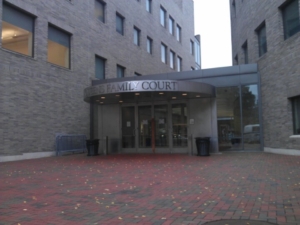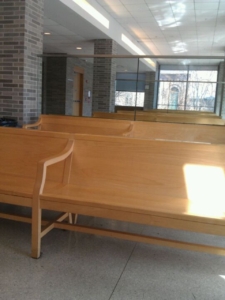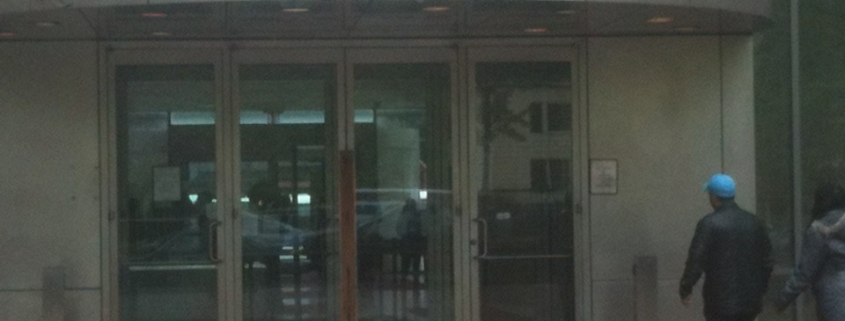A Story of Family
 A line was already forming outside the glass doors of Queens County Family Court, on a grey February morning. It was 7:45. Inside, police officers milled about sipping coffee while municipal employees with key card access politely skirted the crowd, buzzing themselves in through a side door. At 8:00 one of the officers unlocked a front door allowing us to wait inside a small interior vestibule. We stood there, grateful for the warmth, until the court’s official 8:30 opening.
A line was already forming outside the glass doors of Queens County Family Court, on a grey February morning. It was 7:45. Inside, police officers milled about sipping coffee while municipal employees with key card access politely skirted the crowd, buzzing themselves in through a side door. At 8:00 one of the officers unlocked a front door allowing us to wait inside a small interior vestibule. We stood there, grateful for the warmth, until the court’s official 8:30 opening.
When the line began to move, my husband and I removed coats, belts, and the contents of our pockets, placing the items on a conveyor belt.
There are reasons for the security; people are possessive where children are concerned. The sense of entitlement has a biological basis. Seed fertilizes ovum, fetus grows to full term, and we assume ownership. When the rights of parenthood are threatened, personal identity is jeopardized and emotions rise.
Sometimes we are forced to make choices that alter the course of our lives. Deciding to pursue custody of someone else’s child is one of those choices.
I’m not a parent. As much as I delight in the company of children, I never felt the call to motherhood.
There are reasons. My own young mother appeared trapped in a world not of her making. A precocious child, I sensed her despair. And though I was loved, her all-consuming unhappiness felt claustrophobic. By my late teens I knew I’d never be a mother.
Protecting a child, however, is a normal human response. My husband and I were at Court that morning to file a petition for custody of my eight-year-old grandniece. At the time neither of her own parents seemed capable of providing her a safe home environment.
Here I must stop for a moment. I write from the well of my personal experience. I truly believe we learn from the stories of others. We grow our sense of connectedness when blessed with confirmation that others struggle as we do. Or when we realize that there are some of us living lives we never thought possible. Still, I am concerned with too much revelation. Am I being disloyal? Do I have the right? Will someone reading this piece lack empathy? The tension between telling truth and revealing too much must be confronted every time I put word to page.
* * *
Habitually in and out of trouble, my grandniece’s parents’ meltdown was simultaneous this time. As they sat in jails, in two different states, their daughter went missing—or at least no one in the family knew where she was. From my Los Angeles home, I immediately called New York City’s Administration of Child Services (ACS). ACS was familiar with the family.
Her father, before being jailed at one of ten Rikers Island facilities on unrelated charges, had once again stolen his daughter from her mother, who was being held in jail outside of Seattle, Washington. Each was immersed in their own personal turmoil, each incapable of caring for their only child. ACS suggested that we petition for custody in person, giving me the address to the court. We flew to NYC.
Again I pause, remembering my father’s edict: Don’t get arrested. Don’t do anything that makes them have to put you in handcuffs. And I feel the shame accompanying the knowledge that it is a family member who is acting out, misplacing a child, becoming increasingly familiar with the back seat of a patrol car. I remind myself that shame is destructive, and the keeper of dark secrets. Light is needed. Light brings clarity and a chance for healing. So I write.
* * *
 The Courthouse, an ugly block-like structure with no discernible architectural pedigree, seemed to serve as a protective barrier. The civil servants, tasked with addressing the needs of a sometimes desperate and angry public, needed the protection.
The Courthouse, an ugly block-like structure with no discernible architectural pedigree, seemed to serve as a protective barrier. The civil servants, tasked with addressing the needs of a sometimes desperate and angry public, needed the protection.
Once our petition was filed, we sat in a large atrium, equipped with a non-working sound system. A court clerk shouted out names as the other clerks worked their way through the pile of petitions. One by one a parent or other interested party walked up to the Petition Assistant’s Desk to be told what to expect as their particular case moved through the process. I approached the desk and asked how long I would have to wait and was abruptly told: “Lady, step away from the desk, there are lots of people ahead of you”—my “Thank you” was met with a surprised, “You’re welcome.” Back in my seat, I wrapped myself in the warm winter coat usually packed away in a trunk back home in Los Angeles. Hours passed. We waited.
A variety of New York residents waited with us. I quietly watched, curious about their stories. I allowed my imagination to take hold. Who was seeking child support? Who, visitation rights? Who was there to answer neglect or abuse claims or summons? Some were alone. Others accompanied by groups of family and friends, all attempting to gain or regain access to children.
The despair-heavy air hung like a cloud in the room, affecting its inhabitants. The building’s interior absorbed emotion like some great concrete beast, its body parts—tiled floors, florescent lighting, and cold brick walls—gaining strength.
I wailed my anguish into my sister’s voicemail. She was unaware of our purpose that morning, having thrown up her hands at the antics of our niece and nephew-in-law many months earlier. I chose to spare her the details until the circumstances forced my decision to reach out. She called back, throwing me a supportive lifeline. Her calming voice provided a place to pour my sadness.
* * *
The citizens I encountered over my two days at family court appeared to be a cross section of working class New York, the kind of citizen that scraped dollars together to pay the attorney specializing in family law. The prosperous don’t usually have to file petitions in person, do they?
Our emergency necessitated that we make an appearance. Finding a lawyer would come next.
* * *
Again, on the second day we arrived early. We were directed to wait in a sitting area near the presiding judge’s chambers. Having planned better, I wore more comfortable shoes.
Sitting nearby were two young black women. We eyed one another, a silent, adversarial sizing up. My husband, quietly napping next to me, didn’t notice.
I attempted to eavesdrop, missing most of their conversation. But something sparked a sense of familiarity; a pair of saucer-like ebony brown eyes. They reminded me of my grandniece’s eyes. I approached the women and introduced myself. My hunch paid off. The two women were my grandniece’s paternal aunts, our tentative conversation became a cautious beginning.
I could sense their wariness. None of us knew what to expect from each other. During our discussion it became clear they were at court for the same reason I was, to petition for custody. At the time my grandniece went missing, the police contacted one of them. Her father had left her with an acquaintance upon his arrest. The acquaintance handed her to the police. The child is at the precinct. Please come get her.
* * *
 Courtrooms have a way of bringing home the weight of one’s dilemma. Islands of democracy, they serve to remind us of our system of laws. As partisanship, lies, and coarseness infect much of political life, decorum and adherence to procedure have a way of reminding the participant that our court system is structured to mete out justice. As I walked into the courtroom, I was struck with the solemnity of the place, and it seemed right that I felt a sense of awe.
Courtrooms have a way of bringing home the weight of one’s dilemma. Islands of democracy, they serve to remind us of our system of laws. As partisanship, lies, and coarseness infect much of political life, decorum and adherence to procedure have a way of reminding the participant that our court system is structured to mete out justice. As I walked into the courtroom, I was struck with the solemnity of the place, and it seemed right that I felt a sense of awe.
* * *
Inside, we pleaded our cases. An ACS representative filled in details of established parental neglect. It became clear that everyone in the courtroom shared a genuine concern for the welfare and safety of my grandniece. Because the child knew her paternal aunts better than she knew us, and because she had already been through enough, the Judge granted temporary custody of my grandniece to one of her paternal aunts. I felt relief for my grandniece, coupled with the new knowledge that we weren’t in this alone.
Tensions dissolved quickly once the hearing ended. Lawyers listening from the back of the courtroom approached, handing me their cards. My husband and I sat with the aunts on a bench and talked—and talked. A bursting dam of commiseration, filled with dysfunctional family drama, shared. We’ve been talking ever since. Before flying home, I visited with them and hugged my grandniece. We made plans.
The ordeal is far from over. There will be more hearings. Both parents are troubled. They are also loved. And though taking a child away from someone you love is a particular sort of anguish, the needs of their little girl must come first.
* * *
I’ve always been conflicted. I like my quiet, artsy life. Yet here I am petitioning for custody of someone else’s baby. Raising a child as a grandmother, having never raised a child before, was not what I planned for myself. For now, my grandniece lives with her young aunt’s family in Queens, New York. My husband and I are supportive of that arrangement. But until a final decision is made, we investigate schools and ask friends for advice. Los Angeles ACS has arranged to pay us a visit in order to evaluate our fitness. We may need to find a bigger apartment.
 Many of my friends are parents; men and women who have raised or are now raising children. I marvel at those young people and the accomplishments of their parents. It is no small feat to produce responsible young adults and launch them into the world. How is it done? What’s the formula? It seems a gamble. Some turn out fine; while others, not so much. Disparity often occurs among the branches of the same family.
Many of my friends are parents; men and women who have raised or are now raising children. I marvel at those young people and the accomplishments of their parents. It is no small feat to produce responsible young adults and launch them into the world. How is it done? What’s the formula? It seems a gamble. Some turn out fine; while others, not so much. Disparity often occurs among the branches of the same family.
I’m beginning to feel as though I’m gaining something new, however. I receive regular reports on how my grandniece is doing in school. I talk of her with her two young aunts on the regular. Is she adjusting? What should we tell her about her parents’ troubles? It’s as if my family has grown. I find that gratifying.
Writing it down has been gratifying as well, a sort of gift to myself. My hope is that it is a gift to others. Our lives are complicated. We isolate, and for reasons of privacy or shame refuse to share. However, we are social creatures, we are storytellers and strength is gained in community.
 Angela Bullock is an actor/writer pursuing an MFA in Creative Nonfiction at Antioch University LA.
Angela Bullock is an actor/writer pursuing an MFA in Creative Nonfiction at Antioch University LA.





